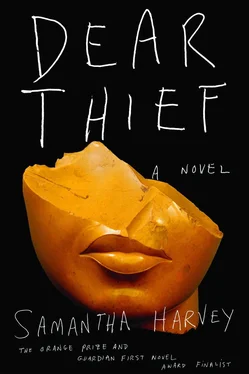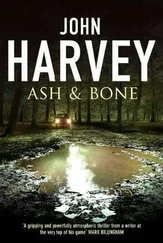I have thought about this since. England has always seemed to you sort of jolly, neat, falsely gay. Unable to contend with the prospect of a God who gets his hands dirty. But Spain was another matter; from the moment you set foot in Spain you felt it was the kind of place that could worship a God who got down with the slick and seminal things. Maybe an irrational thought, but even so. Something about the way the land itself had seemed to sink through the hot air like a layer of sediment, and felt dense and warm to walk on, whereas in England the fields and hills sit pertly, like some nervous pre-pubescent girl.
Almería had scorched afternoons and clammy dark evenings, oversized insects and locals with oily overcooked skin, steep orange desert canyons, red dust that stuck to sweat, warm, slow-moving tides pulled by distended moons towards the unknownness of Africa, viscous bull blood, a lump of unfamiliar animal on a dinner plate. This overgrowth, this slight impure libidinous danger — it always makes you draw a connection with that hot messy passage in the Upanishads where God opened the suture of the skull and entered the first human. We are egg-born, it says: egg-born, womb-born, sweat-born, soil-born. God is passed on in the exchange of seed. England turns its head politely, either too pragmatic for God, or too squeamish for this God. But in Spain, where people were so much freer with their flesh, touched more, laughed more, were irrational and passionate and callous and more easily angered; in Spain you would not be laughed at if you tried to get to heaven by going downwards rather than upwards, if you tried to get there by passing through another’s flesh.
This is what it says in the Aitareya Upanishad: a man is inside himself in the form of a seed. It is only when he ejects that seed into a woman that he is born. But he must be born again and again before he can break out of the body and be free. Your road to freedom passes through the bodies of others; it does not involve some levitation of your spirit or the quelling of the things that stir in your loins. God put that stirring in your loins so you could be born into another, and thus start your journey to immortality.
So now, flushed, I see you. You are thinking back to the Plaza de Toros, and even now you can feel the sweat between your thighs and see the crowd tossing cushions into the air, which is beginning to feel like boiled milk. In the noisy heat of the bullring you need something; not a cigarette, it is too hot for smoking, maybe a shot of something dissolved in water. Needle better, but no needles on this holiday. It is not that you need a lift, but that you feel lifted and want to celebrate it. You cannot even say why you feel this way in this heat, which is insufferable, at this bullfight, which is disgusting — but something has risen in you that feels like religious feeling, or divine licence, which is close to rage and hate and love all at once.
Something of that mood was with you from the moment you set foot on Spanish tarmac, heightening at the sight of the desert badlands and in the markets of La Chanca and in the orange spears of the bird of paradise that grew in the garden. And oh, I know, I know — you will be finding my memory of it all a little too stagey and false. The blood and the heat and the flora and the sex; the lust in the dust . True enough, Spain has become a filmset to me, the whole of it barely more real than Fort Bravo itself. It has become a piece of strange theatre in the otherwise prosaic run of my life, and maybe this is the only way I can understand it. But all the same there are the facts, whereby on the last night, after the bullfight, with the moon hanging between the villa and the sea, you, feeling irrepressible, lay naked on the grass when you thought everyone else was in bed, and might have been surprised — though maybe not all that surprised — when Nicolas came to you.
Do you not think I know how many times you have wished this letter had not arrived, since all it does is remind you of things you are no longer interested in. You think I don’t know how uninterested you are, but I know. You are not interested in the recriminations that so tediously follow what you and Nicolas did that night; it is like recriminating a woman for slingshotting a dove, without acknowledging that she did so to feed her starving child. Sometimes the ends justify the means, and you are tired with this banal preoccupation with the means only. But the very mention of Spain from a third party, from a source outside your own mind, is one of the more interesting turns the letter has taken. You read the section from the Upanishads again and your heart swells. Sage Wāmadewa, broke out of the body, did all that he desired, attained the Kingdom of Heaven, became immortal; yes, became immortal.
Suddenly the geese on the screen look no more substantial or significant than puddles that have evaporated. It is their sound you now notice, that rough feverish call to adventure, calling you back to the realm of things that exert themselves with living. If you are ashamed at all of what you did, it is because you now know better; Nicolas, or any other man or woman or living or non-living thing, was never going to save you. But you are not ashamed of adultery, which is, as the name suggests, adults being as such. So when I got out of bed and came out to the garden to see where Nicolas had gone, and saw you no more than fifteen feet away, astride him on the grass facing the villa, you did not freeze with guilt, but looked at me and shook your head, left, then right: a firm, complicit no.
One of your hands was resting on his chest, trying to feel for the banging, longing muscle of heart inside. Spain has shown you a tunnel out of yourself, into the world of action. As Nicolas joins you in the tunnel you think of that very passage in the Upanishads that starts with God dredging a bull from the depths and culminates in Sage Wāmadewa’s immortality. And now sex feels like a religious act; the whole holiday feels like a religious act, and England and marriages and pastures and cool summers are a blasphemy.
Sage Wāmadewa did all that he desired; why not you? More fool those who do not. Life is short. Life shoots you a lethal dose of time. Time is a drug that wears off. You seem to stare at me from under that crooked fringe as if to say, You brought this up. Or worse, as if to say: Put your pen down, my friend, forget it; I will never be sorry. I was trying to save myself; I failed, but at least I had the dignity to want to be saved. More fool you, if you don’t want to save yourself too.
But really, is that what you call saving yourself?
When I last saw you, you did not look like a person who was saving herself. I always see that platform empty of trains, and you at the far end. When I see this I have to wonder if you are even alive, and I tell myself you must be, simply because death has a strangely efficient grapevine and we would have heard if you weren’t; this is my only consolation, and maybe an empty one at that. You left us in the winter with a little bit of Spanish tan still on your arms, and you came back pale and thin as paper. A little under two years without sight or word of you, and there you were all of a sudden with your weight off one foot, an animal that has been shot in the flank, not the heart. Like I said before, a wounded wolf. The flank slack; head hung, shoulders dropped, eyes half closed. Sore is the word that comes. You were always quite solemn and meek in profile, something that surprised me every time I caught you from the side; this day you were especially meek and harmless — maybe it was the dip of your head, or the way your head looked too heavy for your shoulders. But when I walked nearer you looked up, flashing pure irony, and you smiled ruefully in the way people do when they think something morbid is funny.
Читать дальше












